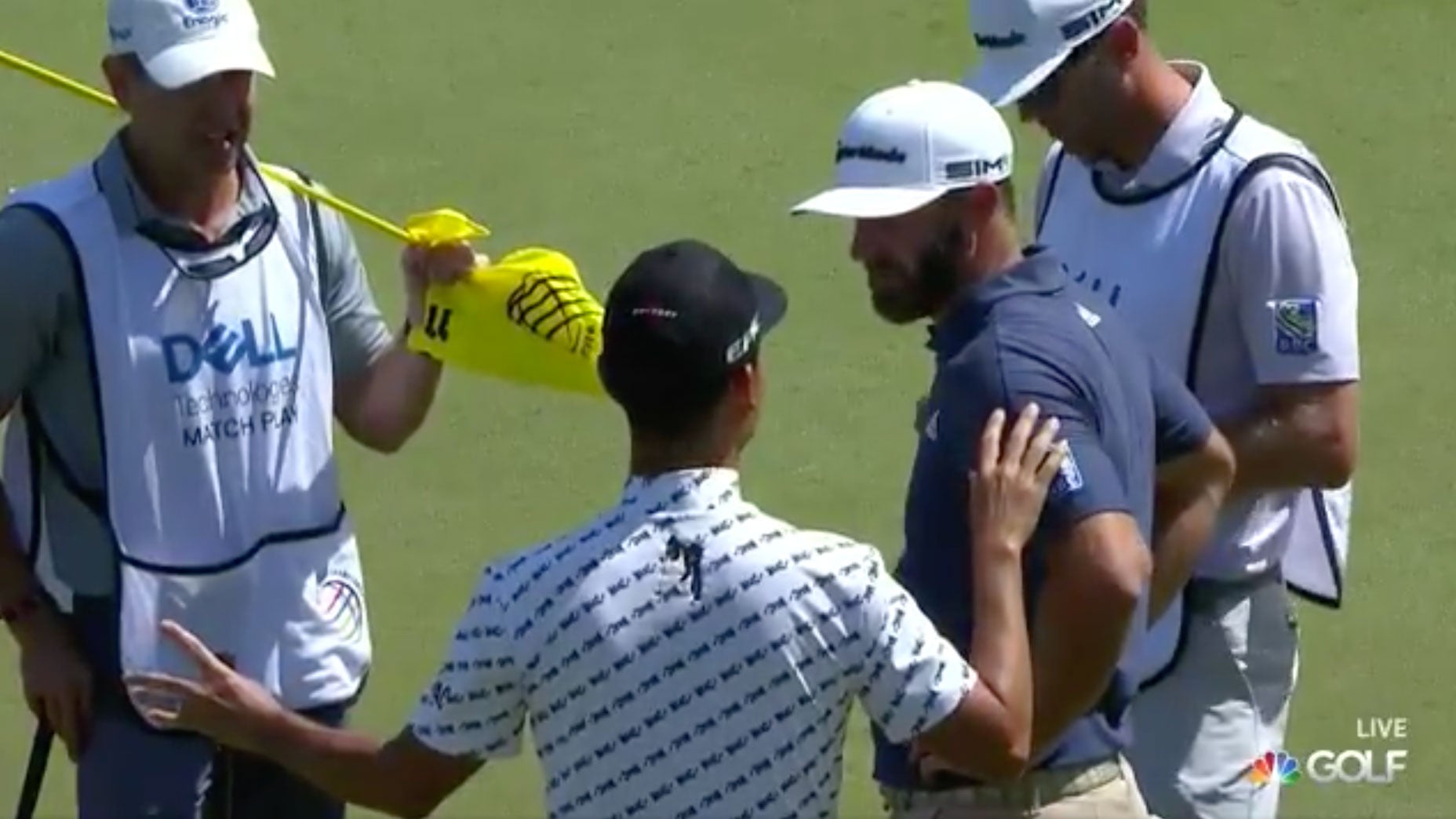At least one question remained unanswered, at least publicly, in the aftermath of the Dustin Johnson-Kevin Na concession controversy at the WGC-Dell Technologies Match Play: Why was Na permitted to retroactively concede Johnson a putt, when such an action is prohibited under the rules?
A quick refresher: In his Friday match against Na, Johnson lipped out an eight-footer for birdie on the 11th green, leaving himself a kick-in, which presumably Na would have conceded. But before Na gave any indication that the putt was good, Johnson scooped up the ball and began walking off the green, only for Na to summon him back.
“I know it’s this [close], but you still have to wait,” Na told Johnson, using his hands to demonstrate the length of the putt. Johnson didn’t say much in response, and what he did say wasn’t picked up by microphones. On the way off the green, Na said he wasn’t claiming the hole; he was just making a point.
After the round, Na told reporters, “Obviously it’s good, but I hadn’t said anything, and he whacked it.” Na was facing a three-footer of his own, too.
“I called him over and said, ‘Hey, I’m not going to take the hole from you, but I just want to let you know before I said something you whacked the ball,’” Na said. “But I’m going to give that putt to you so we’ll call it a halve and go to the next hole.”
But that wasn’t the whole story. It couldn’t be, because under the rules of match play, a player may not retroactively concede a putt. Players also are not permitted to waive enforcement of a rule.
So, what gives?
Both players were absolved of any wrongdoing because Johnson said he thought he heard Na concede the putt, Gary Young, the Tour’s vice president of rules and competitions, told GOLF.com on Saturday.
“They were saved by the fact that Dustin — and I asked him and we had this conversation in front of the rules committee who were all hearing it and Dustin was very honest — he just said I got to be honest that I thought he said, ‘That’s good,’” Young said.
Na claimed otherwise, which led to both a huddle on the 11th green and the meeting with the rules committee.
When Young and the rules committee heard Na explain the incident in his post-round interview, Young said, it created “a possible problem.”
So they called in both players.
“The first player I talked to was Dustin and I asked Dustin to please explain to me what had occurred on the 11th hole and what led to him lifting his ball,” Young said. “I saw that he had missed the putt and I said I want to hear it in your words what exactly happened that made you think that you could lift that ball and that the putt was conceded.
“He said, ‘Well, as I walking toward the hole, it was windy,’ and he said, ‘I thought I heard him say, ‘It’s good.’ So I scooped it away. And I said, ‘So you heard him say that?’ And he said, ‘Yes, I did.’ And he said, ‘I didn’t think anything of it and I walked away and it wasn’t until later that Kevin came up to me and said to me, ‘Hey, I didn’t concede that putt, just so you know. Next time, make sure.’”
Because Johnson said there was miscommunication, Young said, he would have been allowed to replace his ball without penalty according to Rule 3.2 b (2). But because Na said he was going to concede the putt, Young said, “we’re not going to make them place it back and then Kevin concede it.”
If Johnson had told the rules committee he had not heard Na, and the two had said, “Well, I’m just going to overlook it, I conceded that putt — well then, it would have been disqualification for both competitors,” Young said.
“Ultimately, it’s what Dustin believed he heard, and of course in golf, we always take players at their word,” Young said. “The rules are based on that people are always acting with honesty and integrity. And that’s just the way we apply the rules.”
Na won the match 1 up, though neither player advanced to Saturday’s quarterfinals.
The semifinals and final will be conducted Sunday. And if there are any concessions then?
“Well, I think anytime we have a referee walking with the group it’s pretty standard procedure that we would say to them on the first tee, gentlemen, let’s make our concessions clear,” Young said.
“In this situation, we were operating as a committee. We did not have walking referees assigned to each match. We did not have the number of officials on site to be able to do that. For the first rounds of this event, we’ve just been operating as a committee, which means we do not interject ourselves. It’s up to the players to resolve issues among themselves and if there’s any question, then they can call in a committee member.”
